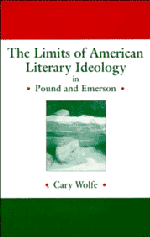7 - Signs That Bind: Ideology and Form in Pound's Poetics
Published online by Cambridge University Press: 08 February 2010
Summary
The young Ezra Pound may have seen his Emersonian respect for “the peripheries of the individual” culturally codified in Henry James – may have seen in James, that is, what James himself traced to Emerson. But Henry James was not the only go-between who enabled the literary ideology of Emerson to flourish (unbeknownst to the inheritor) in our modernist, who could not recognize his precursor's cultural politics, so much his own, through the persistent mist of transcendentalism. This other agent of ideological transmission, Ernest Fenollosa (like Emerson, a native son of Boston and its environs), would have surely fancied himself as much the opposite of his contemporary Henry James as Pound thought himself (when he thought about it at all) the antithesis of Emerson. But those differences only underscore how powerful, seductive, and flexible this ideological structure is. It can accommodate the discursions of James – “weaving an endless sentence” as Pound remembered him in Canto VII – and the Chinese compression of Fenollosa alongside the modernism of Pound and the romanticism of Emerson. For reasons of temperament and training, Pound would not have taken his ideogrammic poetics from Emerson himself. But take it he did, not from the source but from the sinologist who taught Emerson in Japan when he began to explore the world of the ideogram.
Throughout 1913, five years after her husband's death, Mary Fenollosa – herself a novelist of some note (a.k.a. “Sidney McCall”) and an anthologized poet as well – kept watch for someone who might edit her late husband's notes on Chinese poetry and Noh drama.
- Type
- Chapter
- Information
- The Limits of American Literary Ideology in Pound and Emerson , pp. 185 - 216Publisher: Cambridge University PressPrint publication year: 1994

